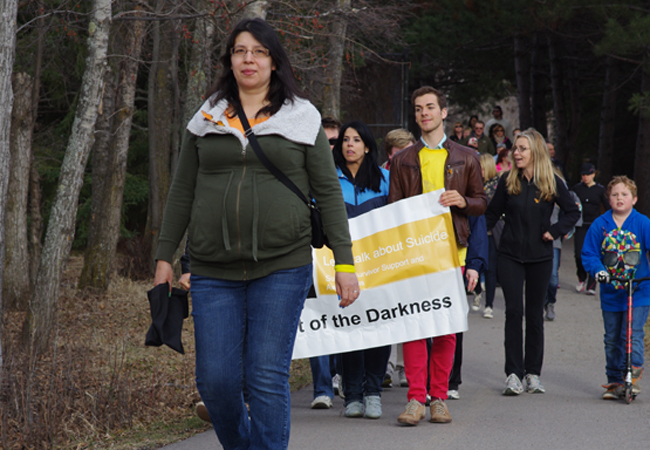Walk honours those lost to suicide

By Rick Garrick
THUNDER BAY – Wikwemikong’s Lisa Bishop and son Zenith recently honoured the memory of their late husband and father at the Out of the Darkness Memorial Walk in Thunder Bay.
“This is my third year that I’ve come with my children,” says Bishop, who lost her husband to suicide in 2010. “It’s a very emotional time to come here. It brings back a lot of feelings, but it feels like a safe place to do that.”
The Out of the Darkness Memorial Walk was created just for those reasons: to celebrate the lives of loved ones lost to suicide and to gain support from others who have also lost loved ones.
“The goal is to help raise awareness around suicide, but also to help erase the stigma,” says Margaret Hajdinjak, who founded the Out of the Darkness Memorial Walk four years ago after losing her son to suicide. “We want people to come out to walk with other people who know how you feel. It’s very comfortable; you know someone knows exactly how you feel.”
While First Nations people suffer an overall suicide rate that is about twice the rate of the total Canadian population, according to the Aboriginal Healing Foundation’s 2007 report “Suicide Among Aboriginal People in Canada”, former National Chief Shawn Atleo noted last September that the suicide rate among First Nations youth is even higher.
“At five to seven times higher than overall suicide rates in Canada, First Nations young people need every support required for its prevention,” Atleo said.
The Union of Ontario Indians, the Association of Iroquois and Allied Indians, the Chiefs of Ontario/Ontario First Nations Young People’s Council and Nishnawbe Aski Nation recently collaborated on the Life Promotion Project to combat youth suicide. The three-year project has since trained more than 80 community support workers from 53 First Nations to deliver safeTALK workshops in their respective communities.
Pic River’s Janine Desmoulin, one of the safeTALK trainers, walked in memory of her brother-in-law, a cousin and a close friend during the Out of the Darkness Memorial Walk.
“I’m just coming out to support mental health awareness and suicide prevention,” Desmoulinsays. “Everyone has been affected in one way or another, either indirectly or directly. A lot of people struggle with mental health.”
Depression, hopelessness, low self-esteem or negative self-concept are listed by the AHF report as the top risk factors for suicide among Aboriginal youth.
Bishop says the survivors of suicide should not blame themselves for the suicide.
“Just because someone they loved took their life, it doesn’t mean they did something wrong to lose them,” Bishop says.
Bishop would like to see more First Nations people joining in on the Out of the Darkness Memorial Walk.
“The only way we can help reduce this is by supporting each other and being there for each other and giving people options so they know suicide isn’t the solution for what they are feeling.”


